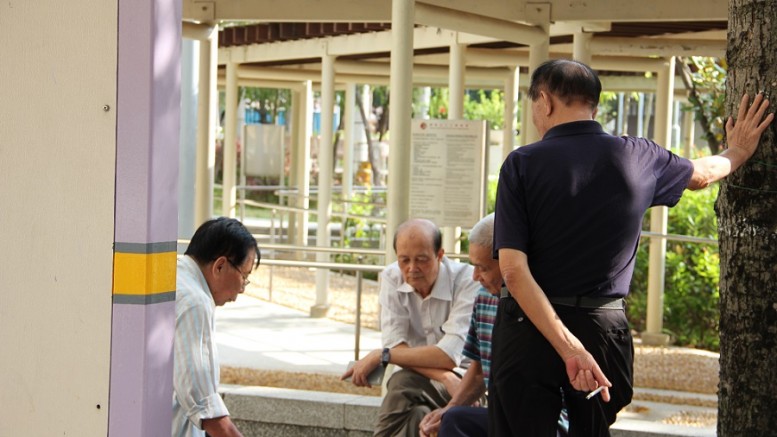By Andrew Leung Kwan-yuen –
The Commission on Poverty has recently launched a six-month public engagement exercise on retirement protection with two proposals: First, the “regardless of rich or poor” principle and second, “those with financial needs” principle.
For the sake of illustration, if an elderly is entitled to receive HK$3,230 per month, the overall increased expenditure for the next 50 years will be HK$2,395 billion for the “regardless of rich or poor” scheme and HK$255.5 billion for the “those with financial needs” scheme.
In other words, you and your next generation will have to face a steep salaries tax raise of 8.3% if the Government opted for the “regardless of rich or poor” scheme and 0.9% for the “those with financial needs” scheme.
This consultation aroused heated discussions amongst the general public. Some non-governmental organizations have issued reports and their views on retirement protection scheme. For instance, the Bauhinia Foundation Research Center released a study on retirement protection and proposed a robust retirement protection by setting up a “Public Pension” scheme and by refining the Mandatory Provident Fund system.
Law Chi-kwong, member of the Poverty Commission, said during an interview that he has reservations on the prospect that a universal pension system can be put in place amid massive resistance. He pointed out that the universal pension scheme can only be successful if and only if the public is willing to shoulder the financial burden. This is the crux of the matter.
The latest figures from the Census and Statistics Department show that in 2014, the number of people aged 65 or above reached 1.07 million. At present, the elderly dependency ration is 4.5:1. However, it has been estimated that in twenty years this ratio will drop significantly to 2:1.
Aging population is a ticking time bomb. Do you remember the 2010 pension reform strike in France? There was a series of general strike and demonstrations to protest the French Government’s plan to raise the normal retirement age for public pensions from 65 to 67 and early reduced pensions from age 60 to 62. Despite strong oppositions, the French Government did not bow its head.
Countries that operate under universal public pension fund, such as Australia and UK have also realized that the scheme is not sustainable with the ageing population. The British Government is gradually increasing the State Pension age for men and women to 66 between December 2018 and October 2020. The Australian Government even took a step further and increased the retirement age to 70.
We must stay away from known mistakes rather than embrace them. I am at a loss as to why a certain part of the Hong Kong public still insist on following those countries’ wrong footsteps which have time and again proven to be a dead-end.
Aging population and elderly poverty are two immediate threats that the Hong Kong Government has to address. The “regardless of rich or poor” principle is without a doubt an act of equality, however it is definitely not an act of fairness. Surely, it is not fair to ask our children and grandchildren foot the bill and shoulder our burden.
Furthermore, given the inherent unsustainability of the scheme, there is no guarantee that the younger generation who made generous contribution to us would receive the same amount of benefit when they retire. Also, there is a real risk that the younger generation would have to significantly delay their retirement age like the French and Australians.
Improving existing retirement protection schemes better option
Perhaps a better way forward is for the Government to improve the existing retirement protection system. Hong Kong has adopted a multi-pillar retirement protection system: social security, Mandatory Provident Fund, voluntary savings and public services. All of these have their inherent strengths and weaknesses. The proposed cancellation of the Offsetting of the Severance Payments and Long Service Payments with MPF is however, not an improvement as the Government would like it to be and will only cause more problems rather than solving any. If the cancellation goes ahead, many SMEs may be forced to close down.
In Hong Kong, SMEs employed over 1 million employees and are one of the most fundamental pillars of Hong Kong’s economy. Years ago when the Government lobbied the SMEs to support the implementation of the MPF, it promised the SMEs that MPF would adopt the ORSO scheme and use it to offset Long Service Payment and Severance Payment. Cancelling the offsetting mechanism not only violates the original legislative intent, but also blatantly disregards its legislative commitment. It will be all the more difficult for the business sector to trust the words of the Government next time when their support is needed.
The Government should support SMEs and improve the business environment rather than creating new and obstacles. Retirement protection is a very delicate topic. If the Government decided to review the MPF system, it must gain consensus from the Labour Advisory Board tripartite and evaluate the business environment, especially the impacts on SMEs. Making rush decisions without extensive consultations and assessments may severely affect Hong Kong’s long term economic development.
We only have limited resources and therefore we need to consider its sustainability and impacts towards the future public finances. The Government should on the one hand encourage people to be prepared for their own retirement and on the other improve existing policies, such as poverty and welfare, and perfect the MPF scheme so as to provide an adequate retirement protection for the elderlies.
Parents should only leave wisdom and experience to their children, not heavy burdens that would hinder them from flying high.
Andrew Leung Kwan-yuen is a Legislative Council member, representing functional constituency (industry 1). This is an edited version of his Letter of Hong Kong at RTHK broadcast on February 14.
Photo: VOHK Picture


Be the first to comment on "Hong Kong should avoid pension fund mistakes"